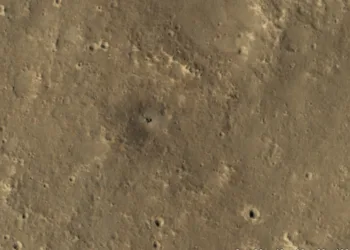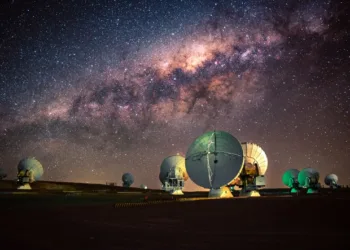Enceladus, the sixth-largest moon of Saturn, has emerged as a compelling frontier in the quest for extraterrestrial life within our solar system. Recent revelations from the Cassini spacecraft and subsequent scientific research have unveiled tantalizing clues suggesting the possibility of life beyond Earth.
The spacecraft’s findings unveiled a global subsurface ocean nestled beneath Enceladus’s icy crust. This ocean, teeming with potential, ejects water-rich plumes, rich in molecular hydrogen and other volatiles, into space through the moon’s south polar region. These plumes feed Saturn’s E ring, hinting at the presence of hydrothermal activity akin to life-supporting conditions found on Earth.
One of the significant breakthroughs was the detection of phosphorus in the form of phosphates within the icy grains expelled from Enceladus’s plumes. Phosphorus, a fundamental element in the structure of DNA, cell membranes, and crucial energy-carrying molecules, represents a critical building block for life as we understand it. Combined with the presence of carbon, hydrogen, nitrogen, oxygen, and sulfur, Enceladus’s ocean appears to possess all the essential elements conducive to life’s existence.
Moreover, the detection of hydrogen within these plumes implies a potential source of chemical energy that could sustain hypothetical microbial life forms, mirroring the conditions surrounding Earth’s hydrothermal vents where life thrives without sunlight. The presence of organic molecules like acetylene, propene, ethane, and hydrogen cyanide further bolsters the prospect of life-sustaining chemical reactions.
However, while these findings offer promising insights into the potential habitability of Enceladus, concrete evidence of life remains elusive. The discoveries underscore the need for further exploration and dedicated missions aimed at examining biomolecules within the plumes to ascertain the existence of life beyond our planet.
Scientists and space agencies are considering future missions to Enceladus, poised to delve deeper into the moon’s secrets and potentially uncover signs of life. These missions aim to explore and analyze the plumes in detail, seeking definitive answers to the age-old question of whether life exists elsewhere in our solar system.
Enceladus stands as a prime candidate in humanity’s search for extraterrestrial life, boasting a subsurface ocean, geothermal activity, and a rich array of essential elements and compounds known to foster life on Earth. While the question of life’s presence on Enceladus remains unanswered, the ongoing pursuit of exploration and scientific inquiry promises to unveil the mysteries of this enigmatic moon, potentially revolutionizing our understanding of life in the cosmos.










